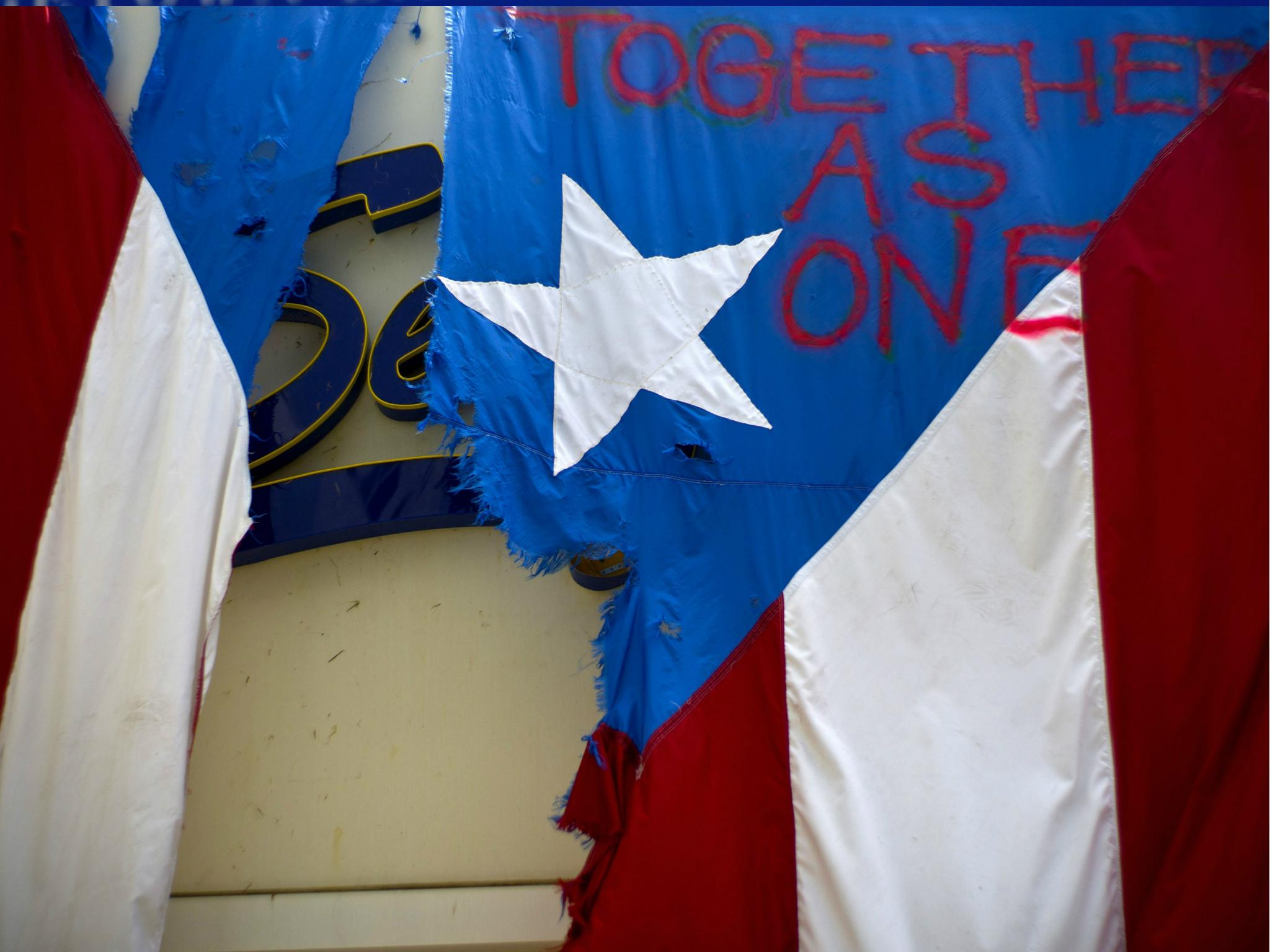Puerto Rico governor 'making every effort to prevent' humanitarian crisis after Hurricane Maria
The Trump administration's waiver of a shipping rule could help in recovery efforts

Puerto Rico's governor has said the US territory is "making every effort to prevent" a humanitarian crisis after Hurricane Maria devastated the island.
Ricardo Rosselló said to CBS News "it's a disaster of unprecedented nature. You need to understand it's been two category 4, 5, hurricanes passing through the island in a span of two weeks."
Over a week after the storm made landfall, 80 per cent of the transmission system and 100 per cent of the distribution system for electrical power remains damaged, leaving most of the 3.4 million American citizen residents without power.
Thousands remain in shelters as food and drinking water supplies dwindle on the island, though the US has deployed Federal Emergency Management Agency (FEMA) workers and US Navy ships to deliver aid.
Mr Rosselló urged people to "keep the help coming" because "we're an island, and resources are harder to come by."
Complicating matters: Puerto Rico also declared bankruptcy in May of this year after a $72 bn (£54 bn) debt crisis.
Donald Trump had been silent for several days following Maria's landfall, instead tweeting more than 13 times about the controversy of National Football League (NFL) players kneeling during the pre-game singing of the national anthem.
He finally addressed Puerto Rico in a storm of tweets late on 25 September.
During a joint press conference with Spanish Prime Minister Mariano Rajoy, Mr Trump said several times that Mr Rossello gave the Trump administration "great reviews" for its work in hurricane relief.
The governor told CBS News that indeed he was "we're very pleased with the communication with the president, with the administration...we're working as one team."
Mr Trump did not offer an explanation for his delayed public comments about the island, but said the US is “Unloading massive loads of water, food, supplies...literally on an hourly basis.”
But, said relief operations were compromised compared to efforts in Texas after Hurricane Harvey and Florida after Hurricane Irma because “there’s this thing called the Atlantic Ocean...tough stuff”.
“We’re going to do far more than anyone else could do.”
One of the criticisms levied on the Trump administration's response to the devastation in Puerto Rico has to do with shipping concerns.
The Jones Act, also known as the Merchant Marine Act of 1920, regulates that goods being shipped between US ports must be carried by ships made primarily in the US. The owners of the vessels must also be American citizens.
Critics say that because Puerto Rico has to import so many goods and commodities, residents bear extra burden because vessels have to be routed through American ports rather than being transported from island countries nearby like Jamaica, therefore increasing the cost of those goods.
However, the Department of Homeland Security issued a two-week waiver of the rule after Hurricanes Harvey and Irma after both caused massive flooding and damage to Texas and Florida, respectively.
The administration has said that was to make up for time lost when oil refineries in Texas were held up by Hurricane Harvey, to avoid delays and increased prices for the busy east coast of the US, and to move along recovery efforts in storm-ravaged areas in both states.
Gregory Moore, a spokesman for Customs and Border Protection, under DHS, said in a statement that US vessels had “sufficient capacity” to move aid supplies, commodities, and fuel to Puerto Rico to help recovery efforts.
“The limitation is going to be port capacity to offload and transit, not vessel availability,” Mr Moore said referring to hurricane-damaged ports on the island.
However, the White House has said it will consider a waiver after several members of Congress requested a year-long waiver. Estimates indicate power may not be restored to parts of the island for up to six months.
"We're thinking about that, but we have a lot of shippers and a lot of people that work in the shipping industry that don't want the Jones Act lifted," said Mr Trump, speaking to media outside of the White House.
The rule is supported by several shippers as a way of protecting American jobs and protection from foreign competition. But, Republican Senator John McCain, still undergoing treatment for a brain tumour in his home state of Arizona, issued a statement that said: "It is unacceptable to force the people of Puerto Rico to pay at least twice as much for food, clean drinking water, supplies and infrastructure due to Jones Act requirements...Now, more than ever, it is time to realize the devastating effect of this policy and implement a full repeal."
Even the previous Bush and Obama administrations both supported the Jones Act as a means of ensuring national security since it eliminated some of the potential threat of foreign vessels.
DHS is a bit hampered by the requirements for a waiver: not enough US vessels and national security interests. The latter could be avoided if a request for the Puerto Rico waiver came directly from the Defence Department.
Mr Rosselo said he expects that the administration will grant the waiver. He acknowledged damaged ports and roads as a cause for concern in transporting goods around the island itself, but said to CNN "at some point of course, getting fuel into the island is going to be critical so that we can have the major functions of telecoms, hospitals, water, to be running appropriately.”
Mr Trump is slated to visit the beleagured island early next week.
Join our commenting forum
Join thought-provoking conversations, follow other Independent readers and see their replies
Comments